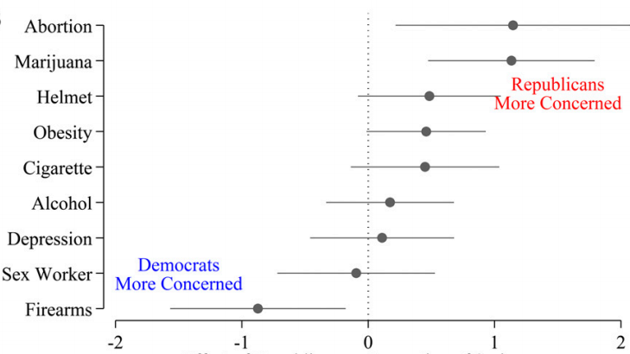Doctors' Political Views Affect How They Treat Patients
How bad is that thrice-weekly pot habit? How dangerous is it to keep a gun in your home? A new study by Eitan D. Hersh and Matthew N. Goldenberg of Yale University suggests doctors’ responses to those and other hot-button issues could be colored by their political views.
Hersh and Goldenberg matched up a list of primary care doctors with voter registration rolls. They contacted 1,529 of them to participate in the study, ending up with a sample of 231 doctors. They then had the doctors read a series of vignettes in which patients recounted their medical histories for a physical. Some of the fictional patients talked about politically charged issues, and those vignettes were interspersed with some more neutral complaints like obesity, depression, or not wearing a motorcycle helmet. One involved a patient who smoked pot three times a week, for example, and another fictional patient said she had two abortions in the past five years. In another scenario, a patient reported being a parent of two small children and keeping guns in the home. Hersh and Goldenberg then asked the doctors to rate the seriousness of each issue and describe how they would treat the patient.
Recommended: Email Etiquette Update: No Need for 'Best,' 'Cheers,' or 'Thanks'
How Serious of Problem Would You Consider This?

Democrat doctors rated the gun scenario as more concerning, but the Republican ones felt the marijuana and abortion vignettes were more serious. The differences were still significant after stratifying the doctors by church attendance, gender, and their patients’ socioeconomic status. Meanwhile, political affiliation didn’t seem to affect their views of the seriousness of issues like heavy drinking, obesity, or not wearing a motorcycle helmet.
Recommended: Alcohol as Escape From Perfectionism
For the more controversial issues, though, the patient’s visit would go differently depending on their doctor’s political views. The Republican doctors were much more likely to discuss the health and legal risks of marijuana and to advise the patient to cut back. They were also more likely than the liberal physicians to discuss the “mental health aspects” of abortion and to urge the patient not to have any more abortions. Interestingly, Republican physicians were also significantly more likely to ask their patients if they were storing their firearms safely, though Democrats were more likely to urge them simply not to have them in the home. (Research shows counseling by doctors can help promote safe gun storage, but most doctors don’t do it.)
“To be clear, we cannot say with any certainty what the root cause of partisan differences in treatment is,” the authors write in the study, which was published Monday in the Proceedings of the National Academy of Sciences. “However, regardless of the underlying mechanism that affects physician judgment, the evidence suggests a clear effect from the patient’s perspective.”
Of course, a Republican or Democratic doctor would likely live in an area where the majority of his or her patients were of the same party. Still, if a contentious health issue is discussed during an appointment, it might be the provider’s political beliefs talking, rather than their medical training. In certain cases, it might be worth getting a second opinion—perhaps a few towns over.
“Just as a patient may seek out a physician of a certain gender to feel more comfortable,” the authors write, “the evidence suggests that a patient may need to make the same calculation regarding political ideology.”
Read more from The Atlantic:
This article was originally published on The Atlantic.
